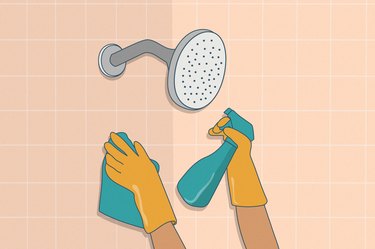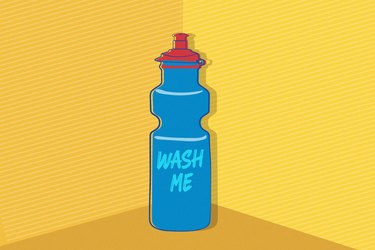
You probably think of the shower as a sanitary space — a pleasant place where you wash away the grime and ditch the dirt your body accumulated during the day.
But how would you feel knowing that your tub is teeming with microscopic bugs like bacteria? That's the reality if you never clean your shower.
Video of the Day
Video of the Day
Uh huh, the ring of soap scum circling the tub and the pink stain around the drain are all plentiful parties of pathogens. But outside of the ick factor (and it's a major ick), can a dirty shower be bad for your health?
We spoke to Kelly Reynolds, PhD, director of the Environment, Exposure Science and Risk Assessment Center at the University of Arizona, to get the dirt on how an untidy tub might make you sick and when sharing a shower stall with microbes is NBD.
It Can Trigger Allergies and Asthma in Certain People
Environments with high humidity (like damp showers) create ideal conditions for mold growth, according to the Mayo Clinic. For most people, a bit of bathroom-based mold isn't cause for concern. "Mold and mildew on your shower curtain, shower walls and bathmat are typically not a problem for healthy individuals," Reynolds says.
However, people who are immunocompromised are at a greater risk of getting sick. For people with mold-induced asthma or allergies, "high exposure levels could trigger an attack" or symptoms commonly associated with upper-respiratory allergies, including watery eyes, coughing and even skin rashes, Reynolds says.
Tip
If you have persistent congestion, sneezing, watery eyes, shortness of breath or other symptoms, visit your doctor, per the Mayo Clinic.
You Could Catch a Skin Infection
While catching a nasty skin infection is more probable in public showers (like the gym or college dorms), it's still possible to contract something when you share a home shower with others and haven't scrubbed your tub in ages.
Yep, microbes that cause fungal and bacterial infections can multiply and flourish on the floor of your dirty shower.
Some of the most common infections include athlete's foot, warts, human papillomavirus (HPV) and methicillin-resistant staphylococcus aureus (MRSA), a type of bacteria that can cause abscesses in the skin, according to the University of Utah Health.
And if you have a cut or blister on your foot, your odds of becoming infected are greater, per the University of Utah Health. That's because an opening in the skin serves as an easy entryway for bacteria and viruses.
Additionally, people who are immunosuppressed are more prone to picking up skin infections from the shower floor.
It Might Lead to Stomach Problems
Some types of germs lingering in your soiled shower — such as fecal bacteria (including E. coli) – may surprise you, Reynolds says.
These pathogens can hitch a ride from your dirty hands (especially when people go number two and don't wash their hands) onto other objects and surfaces (like your shower stall) and spread from one person to another, per the University of Michigan Health.
While many types of E. coli are harmless, some strains can trigger tummy troubles including diarrhea, stomach cramps, nausea and vomiting, according to the University of Michigan Health.
Fortunately, E. coli infections usually resolve on their own within a week. But serious blood and kidney problems may occur in children and older adults, per the University of Michigan Health.
Warning
If your diarrhea from E. coli is persistent, bloody or severe, visit your doctor, per the Mayo Clinic.
It Can Cause Lung Infections in Vulnerable People
If you haven't given your showerhead a good scrub since last century, it could be spraying some gnarly things at you. Yep, while you've probably never noticed, it's likely that fungus has found a home on your showerhead.
Not only is fungus buildup gross, but this type of biofilm can also attract and protect other harmful microbes like the bacteria Legionella, Reynolds says. Indeed, showerheads and faucets can harbor potentially dangerous pathogens including Legionella pneumophilia, per the Centers for Disease Control and Prevention (CDC).
But when people breathe in small droplets of water or unintentionally ingest H2O containing Legionella, they can develop Legionnaires' disease, a serious type of lung infection, according to the CDC.
While Legionella doesn't make most healthy people sick, older adults, people with weakened immune systems and those with chronic lung disease and other underlying conditions are at higher risk of becoming ill, per the CDC.
So, How Often Should You Clean Your Shower?
Even if you're as healthy as a horse, giving your shower a thorough cleanse every now and then is a good idea to keep all the creepy crawlies that accumulate in check. That goes especially if you live with someone who's more susceptible to getting sick.
How often do you need to tidy your tub? As a general guideline, cleaning and disinfecting your shower weekly will help keep mold and bacteria at bay. "If you can see or smell mold, it's time to clean," Reynolds says.
How to Clean Your Shower
Here are Reynold's tips for how to clean your shower:
1. Floor and Walls
Each week, use a mild soap detergent and scrub brush to clean shower surfaces (including any shower tiles and the shower drain).
Once you've removed any visible dirt and muck, spray a mist or foam-based disinfecting product to kill germs. The disinfectant "should always be applied after cleaning [because] the presence of dirt and soap scum reduces its effectiveness," Reynolds says.
2. Bathmats and Shower Curtains
Wondering how to clean a shower liner, curtain or bathmat? Toss them in the laundry (just check the labels to be sure they're washing-machine safe).
If they're not, use sanitizing sprays or wipes to reduce the germ count, Reynolds says. The same goes for shower doors. This can be done monthly.
3. Showerheads
Sanitize showerheads with disinfectant sprays or foaming products. But for a deep clean, "you may need to unscrew them and soak in a diluted disinfectant solution," Reynolds says. "Then use an old toothbrush to loosen any dirt, debris and biofilm."
To keep biofilm growth at bay, make a thorough showerhead scrub part of your spring-cleaning protocol (so, about once a year is fine).
Shower Cleaning Timeline
Every Week |
|
Every Month | Clean shower liners, curtains and bathmats |
Every Year | Deep clean your showerhead |
So, How Bad Is It Really to Never Clean Your Shower?
Bathing in a pathogen-packed shower may affect each of us differently — for some it's no biggie, but for others it can be potentially harmful.
First, consider your health history. If you have existing allergies, mold-induced asthma or a chronic lung condition, cleaning your shower frequently is important. The same goes for people with weakened immune systems.
Next, your showering behavior plays a role. How often you shower, how much dirt is left in the tub and what type of products you use will all affect your shower's slimy factor, Reynolds says. "For example, body washes and shampoos with high oil content can coat shower surfaces and speed up biofilm formation."
Ultimately, if you're an overall healthy person, a dirty shower probably won't affect you too much. But if you're noticing recurring allergy and lung symptoms (or an unexplained stomach bug or skin infection), you may want to clean your shower more often.
- Mayo Clinic: “Mold allergy”
- University of Utah Health: “BEWARE THE SHOWER FLOOR”
- University of Michigan Health: “E. Coli Infection From Food or Water”
- Centers for Disease Control and Prevention: “Legionella (Legionnaires' Disease and Pontiac Fever)”
- Centers for Disease Control and Prevention: "Legionnaires’ Disease"
- Mayo Clinic: "E. coli"
Is this an emergency? If you are experiencing serious medical symptoms, please see the National Library of Medicine’s list of signs you need emergency medical attention or call 911.



